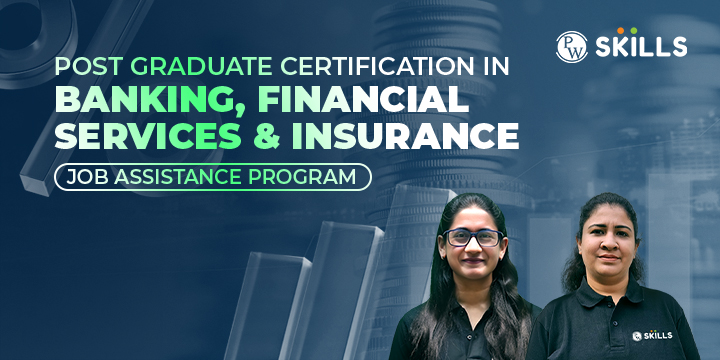Choosing banking courses after graduation is a smart move to boost your earning potential and career prospects in the banking industry. There are multiple courses and programs available that can open doors to high-paying roles in reputed banks.
Banking Courses After Graduation: As someone who has just recently graduated and is looking to kickstart an exciting career in banking, choosing the right post-graduation course can seem daunting.
There are so many options available and it’s difficult to know which ones will truly help set you apart from other candidates and accelerate your path towards a fulfilling role. In this article, we will break down the top banking courses after graduation that recent graduates can strongly consider pursuing.
However, in today’s competitive world, simply completing a graduation course may not be enough. It is crucial to stay ahead of the curve and continually enhance your skills and knowledge. With this in mind, we highly recommend considering the Post Graduate Certification in Banking, Financial Services & Insurance (BFSI) course by Physics Wallah. And the amazing thing is that after applying “STUDYBLISS” coupon code at checkout, you will get discount on PW courses.
Banking Courses After Graduation in India
After completing graduation, individuals often seek specialized courses to enhance their knowledge and skills in the banking and finance sector. Below is a detailed overview of various banking courses available in India:
1) Post Graduate Certification in Banking, Financial Services & Insurance (BFSI) course by Physics Wallah
- Type of Course: Online
- Duration: 3 month
- Overview: Don’t let your education stop at graduation – consider pursuing a post-graduate certification like the BFSI course offered by Physics Wallah. This course not only provides comprehensive knowledge but also hands-on practical experience through internships with leading banks.
2) MBA in Banking and Finance
- Type of Course: Master Degree
- Duration: 2 years
- Overview: This program focuses on providing comprehensive knowledge and skills in banking, finance, risk management, and financial analysis. Students gain insights into banking operations, financial markets, investment strategies, and regulatory frameworks.
3) M.Com In Banking and Finance
- Type of Course: Master Degree
- Duration: 2 years
- Overview: This course emphasizes advanced concepts in banking, finance, accounting, and economics. Students explore topics such as corporate finance, financial reporting, banking operations, and monetary policies.
4) M.Voc in Banking, Stocks, and Insurance
- Type of Course: Master Degree
- Duration: 2 years
- Overview: This vocational program offers specialized training in banking, stock markets, insurance, and financial services. Students develop practical skills through hands-on training, internships, and industry-relevant projects.
5) PGDM in Banking Management
- Type of Course: PG Diploma Course
- Duration: 2 years
- Overview: This program focuses on developing managerial and technical skills in banking operations, financial management, risk assessment, and regulatory compliance. Students undergo rigorous training through case studies, simulations, and internships.
6) PGDM in Banking & Financial Services
- Type of Course: PG Diploma Course
- Duration: 2 years
- Overview: This course provides specialized training in banking, financial services, investment banking, wealth management, and financial planning. Students acquire practical skills and industry-specific knowledge to excel in various roles within the banking sector.
7) Short-term Post Graduate Diploma Programs:
- These intensive programs typically have a duration of 3 months, including 3 months of internship. Some of the short-term courses offered in India include:
- Post Graduate Diploma in Retail Banking (PGDRB)
- Post Graduate Diploma in Banking Operations
- Post Graduate Diploma in Banking
8) Professional Programme in Commercial Banking (PPCB)
- Type of Course: Advanced Certificate Course
- Duration: 2 months
- Overview: This specialized program focuses on commercial banking operations, credit analysis, loan management, risk assessment, and regulatory compliance. Participants gain practical insights and skills required for roles in commercial banking.
9) Advanced Certificate in Banking Laws and Loan Management
- Type of Course: Advanced Certificate Course
- Duration: 3 months
- Overview: This course emphasizes banking laws, regulations, loan management practices, legal compliance, and risk mitigation strategies. Participants acquire specialized knowledge and skills essential for legal and compliance roles within the banking sector.
These banking courses after graduation in India offer a blend of theoretical knowledge, practical skills, and industry exposure to prepare individuals for rewarding careers in the banking and finance sector.
Banking Courses After Graduation With Placement
After completing graduation, individuals looking to pursue a career in banking have various specialized courses they can opt for, which not only provide them with advanced knowledge but also offer placement assistance. These courses are designed to equip graduates with the skills and expertise required to excel in the banking sector. Here’s a list of banking courses after graduation that often come with placement opportunities:
Offered by Physics Wallah, this course is designed to provide specialized knowledge in banking, finance, and insurance sectors. PW offering this certification have tie-ups with leading banks and financial institutions for placements.
The program is not just academically rigorous but also emphasizes the cultivation of essential soft skills and interview preparation, ensuring holistic professional development. Physics Wallah’s collaboration with leading banks and financial institutions is a testament to its commitment to providing students with practical exposure and real-world insights.
Beyond the technical aspects of BFSI, the curriculum places significant emphasis on soft skills development. This includes honing interpersonal skills, effective communication, teamwork, adaptability, and problem-solving abilities. Recognizing that success in the BFSI sector extends beyond technical expertise, Physics Wallah ensures that students are well-equipped with the interpersonal skills required to thrive in dynamic banking and financial environments.
- MBA in Banking and Finance: A two-year postgraduate degree program that provides comprehensive knowledge in banking, finance, and management. Many top B-schools offering this program have tie-ups with leading banks for placements.
- PGDM in Banking Management: A two-year diploma program focusing on banking management, financial services, and related areas. Institutes offering this course usually have a robust placement cell that facilitates placements in reputed banks and financial institutions.
- PGDM in Banking & Financial Services: Another two-year diploma course that emphasizes banking, financial services, and related sectors. Institutions offering this program often have collaborations with banks and financial firms for placements.
- Professional Programme in Commercial Banking (PPCB): This advanced certificate course focuses on commercial banking and related areas. Institutes offering this program often have placement tie-ups with commercial banks for job placements.
- Short-term Post Graduate Diploma in Retail Banking (PGDRB): A three-month diploma course that focuses on retail banking operations. Many institutes offering this course have collaborations with retail banks for placements.
When considering these courses, it’s essential to research the specific institutions offering them and their placement records. Additionally, networking, internships, and hands-on experience can significantly enhance one’s chances of securing a job in the banking sector post-completion of these courses.
Also Read: Private Bank Positions and Vacancies
Short-Term Certification Courses in Banking
Short-term Banking Courses After Graduation with certificates are designed to provide individuals with specific skills and knowledge in various areas of banking within a shorter duration compared to full-fledged degree programs.
These courses are particularly beneficial for working professionals looking to upskill, recent graduates aiming to enter the banking sector quickly, or individuals seeking to switch careers. Here are some short-term certification courses in banking:
- Certificate in Retail Banking: This course focuses on the fundamentals of retail banking operations, customer relationship management, and financial products and services tailored for individual customers.
- Certificate in Corporate Banking: Designed for those interested in the intricacies of corporate banking, this course covers areas such as credit analysis, relationship management with corporate clients, and understanding corporate financial structures.
- Certificate in Financial Risk Management: This program focuses on equipping individuals with skills to identify, assess, and mitigate various types of financial risks faced by banks and financial institutions.
- Certificate in Banking Technology and Operations: With the increasing emphasis on technology in banking, this course provides insights into banking operations, digital banking platforms, cybersecurity, and fintech innovations.
- Certificate in Credit Analysis: This course delves deep into credit risk assessment, loan structuring, and evaluating the creditworthiness of individuals and businesses.
- Certificate in Investment Banking: Aimed at providing a foundational understanding of investment banking operations, mergers and acquisitions, capital markets, and financial advisory services.
- Certificate in Microfinance: This course focuses on microfinance institutions, their operations, lending methodologies, and their role in financial inclusion and poverty alleviation.
These short-term certification courses in banking vary in duration, content, and eligibility criteria. Prospective candidates should consider their career goals, current skill set, and the specific area of interest within banking before enrolling in a particular course. Additionally, it’s essential to verify the credibility of the institution offering the course and assess its industry recognition and placement assistance, if applicable.
Benefits of Banking Courses After Graduation
After completing graduation, enrolling in banking courses can offer numerous benefits to individuals aspiring to build a career in the banking and finance sector. Here are some of the advantages of pursuing banking courses post-graduation:
- Banking courses provide specialized knowledge and skills relevant to the banking industry. This education equips graduates with a deeper understanding of banking operations, financial markets, risk management, and other essential areas.
- Having a specialized banking qualification can significantly enhance your career prospects. Employers in the banking sector often prioritize candidates with relevant qualifications, making it easier to secure higher-paying positions and climb the corporate ladder.
- Many banking courses emphasize practical learning, enabling students to develop essential skills such as financial analysis, banking operations, customer relationship management, and more. These practical skills are invaluable when transitioning into a professional banking role.
- Banking courses often provide students with opportunities to network with industry professionals, guest speakers, and fellow students. Building a strong professional network can open doors to job opportunities, mentorships, and valuable industry insights.
- Completing a recognized banking course can enhance your credibility and recognition within the banking industry. Employers and clients are more likely to trust individuals with recognized qualifications, enhancing your professional reputation.
- Many banking courses offer a global perspective on banking and finance, covering international banking regulations, global financial markets, and cross-border transactions. This global perspective can be particularly beneficial for individuals aspiring to work in multinational banks or financial institutions.
- The banking industry is continually evolving, with new technologies, regulations, and market trends shaping the sector. Banking courses provide an opportunity for continuous learning, enabling professionals to stay updated with industry developments and maintain their competitive edge.
- A banking qualification can open doors to various career paths within the finance industry. Whether you’re interested in retail banking, investment banking, corporate finance, or financial planning, a solid banking education can provide you with the foundation to pursue your desired career path.
Pursuing banking courses after graduation can offer a range of benefits, from specialized knowledge and practical skills development to enhanced career prospects and networking opportunities. Whether you’re a recent graduate or an experienced professional looking to advance your career in banking, investing in further education and qualifications can be a valuable investment in your future.
Also Read: 5 Employee Benefits you get at ICICI Bank
Online Banking Courses After Graduation
With the continuous growth of the banking industry and a rising need for skilled banking professionals, a plethora of online banking courses have emerged. As online education gains momentum, several reputable platforms now offer specialized courses tailored for the banking sector. Many of these courses are available for free and typically span a duration of 3 to 6 months.
They are particularly beneficial for working professionals or students juggling various commitments, making it challenging to enroll in full-time programs. In such scenarios, online banking courses serve as a valuable alternative. Below is a compilation of online banking courses that individuals can pursue:
| Online Banking Courses After Graduation | |
| Course Name | Offered By |
| Post Graduate Certification in Banking, Financial Services & Insurance (BFSI) | Physics Wallah |
| Banking Credit Analysis Process | Udemy |
| Relationship Management in Corporate Banking | Udemy |
| Digital Banking | Udemy |
| Accounting, Finance and Banking-A Comprehensive Study | Udemy |
| Introduction to Managing your Personal Finance Debts- Revised | Alison |
| Financial Freedom: A Beginners Guide | Alison |
| Foundation of Central Bank Law | edX |
| Essential Career Skills for Investment Banking and Finance | edX |
| Risk Management and Banking Financial Markets | edX |
| Capital Markets | edX |
| Economics of Money and Banking | Coursera |
| Financial Markets | Coursera |
| Digital Transformation in Financial Services | Coursera |
| Financial Markets and Investment Strategy | Coursera |
Banking Courses After Graduation Fees
The fees for banking courses after graduation can vary significantly depending on various factors such as the institution offering the course, the duration of the course, the course content, and the mode of delivery (e.g., online, part-time, full-time). Here’s a general overview of the fee range for some banking courses after graduation:
1) MBA in Banking and Finance:
The fees for a 2-year full-time MBA program in banking and finance from reputed institutions can range from INR 5 lakhs to INR 20 lakhs or even more, depending on the institute’s reputation, infrastructure, faculty, and placement records.
2) M.Com in Banking and Finance:
For a 2-year M.Com program specializing in banking and finance, the fees can range from INR 50,000 to INR 5 lakhs, depending on whether it’s a government or private institution and its ranking.
3) PGDM in Banking Management:
The fees for a 2-year PGDM program in banking management can range from INR 3 lakhs to INR 15 lakhs, depending on the institute’s ranking, infrastructure, and other facilities provided.
4) Short-term Certification Courses: Short-term certification courses in banking, which typically last for 3 months to 1 year, can vary widely in fees. Some online certification courses might be available for as low as a few thousand rupees, while specialized offline programs from reputed institutions might cost anywhere from INR 50,000 to INR 3 lakhs or more.
5) Professional Programme in Commercial Banking (PPCB):
Advanced certificate courses or specialized programs focusing on specific areas like commercial banking might have fees ranging from INR 50,000 to INR 2 lakhs, depending on the institution and course content.
Also Read: Best Courses for ICICI Bank Training and Placement
Career Opportunities in Banking Courses After Graduation
Pursuing banking courses after graduation can open up a plethora of career opportunities in both entry-level and advanced roles within the banking and finance sector. Here’s a breakdown of potential career paths you can explore:
Entry-Level Career Opportunities:
- Banking Associate/Assistant: As a banking associate or assistant, you’ll typically work in various departments such as retail banking, customer service, or operations. Your responsibilities may include assisting customers, processing transactions, and promoting bank products and services.
- Credit Analyst: Credit analysts assess the creditworthiness of individuals or businesses applying for loans. They analyze financial data, evaluate risks, and recommend loan approvals or rejections based on their findings.
- Loan Officer: Loan officers work with individuals and businesses to evaluate loan applications, determine eligibility criteria, and recommend suitable loan products. They are responsible for explaining loan terms, collecting required documentation, and ensuring compliance with lending regulations.
- Financial Advisor/Consultant: As a financial advisor or consultant, you’ll provide clients with advice on various financial matters, such as investment planning, retirement planning, and wealth management. You’ll assess clients’ financial goals, risk tolerance, and recommend suitable financial products and strategies.
- Teller/Customer Service Representative: Entry-level positions such as tellers or customer service representatives provide individuals with an opportunity to gain firsthand experience in banking operations. Responsibilities typically include assisting customers with account inquiries, processing transactions, and promoting bank services.
Advanced Career Opportunities:
- Branch Manager: Branch managers oversee the daily operations of a bank branch, including staff management, customer service, and sales performance. They are responsible for achieving branch targets, ensuring compliance with banking regulations, and implementing strategic initiatives to drive growth.
- Credit Risk Manager: Credit risk managers are responsible for overseeing the bank’s lending activities and managing credit risk exposure. They develop credit risk policies, assess the creditworthiness of borrowers, and monitor loan portfolios to mitigate potential risks.
- Investment Banker: Investment bankers specialize in advising corporations, governments, and other institutions on complex financial transactions, such as mergers and acquisitions, capital raising, and strategic investments. They work closely with clients to structure deals, negotiate terms, and execute transactions.
- Portfolio Manager: Portfolio managers manage investment portfolios on behalf of clients, institutions, or mutual funds. They conduct research, analyze market trends, and make investment decisions to optimize portfolio performance and achieve clients’ financial objectives.
- Financial Analyst: Financial analysts conduct in-depth analysis of financial data, market trends, and industry developments to provide insights and recommendations to senior management or clients. They may specialize in areas such as equity research, fixed income analysis, or risk management.
Also Read: What are Relationship Manager Roles and Responsibilities?
Banking courses after graduation can equip you with the knowledge, skills, and credentials to pursue a variety of rewarding career opportunities in the banking and finance sector. Whether you’re interested in starting at an entry-level position or advancing to a specialized role, the banking industry offers a diverse range of career paths to suit your interests and aspirations.
Banking Courses After Graduation FAQs
Why should I consider pursuing banking courses after graduation?
Banking courses after graduation provide specialized knowledge and skills relevant to the banking and finance sector. These courses can enhance your career prospects, broaden your understanding of the industry, and equip you with practical skills required for various roles within the banking sector.
What are some popular banking courses available after graduation?
Some popular banking courses available after graduation include Post Graduate Diploma in Banking (PGDB), Certified Financial Planner (CFP), Chartered Financial Analyst (CFA), Master of Business Administration (MBA) in Banking & Finance, and various certificate programs in areas such as credit analysis, risk management, and financial planning.
Can I pursue banking courses through online or distance learning modes?
Yes, many institutions offer banking courses through online or distance learning modes to accommodate the needs of working professionals or individuals who prefer flexible learning options. Online banking courses provide convenience and flexibility, allowing you to balance your studies with other commitments.
How long do banking courses typically last after graduation?
The duration of banking courses varies depending on the program and institution. Certificate programs may range from a few weeks to several months, while diploma or degree programs such as PGDB or MBA in Banking & Finance may span one to two years of full-time study.
What are the eligibility criteria for enrolling in banking courses after graduation?
The eligibility criteria for banking courses after graduation vary depending on the specific program and institution. Generally, candidates must have completed a bachelor's degree in any discipline from a recognized university or institution. Some programs may also require candidates to have relevant work experience or meet specific academic performance criteria.









